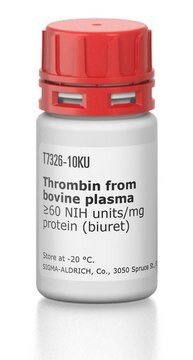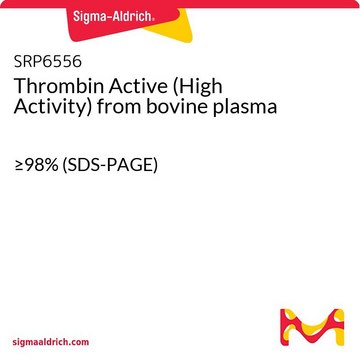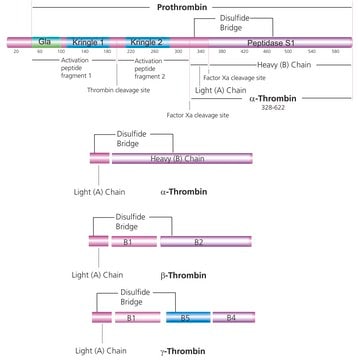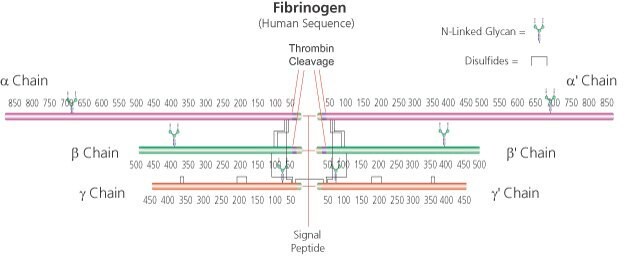Recommended Products
form
lyophilized
Quality Level
specific activity
≥1800 NIH units/mg protein
≥50 NIH units/mg dry wt
manufacturer/tradename
Calbiochem®
storage condition
OK to freeze
solubility
0.05 M NaCl: ≤2000 NIH units/mL
water: >2000 NIH units/mL
shipped in
ambient
storage temp.
−20°C
General description
Native, bovine thrombin. Key enzyme in the coagulation cascade. Converts fibrinogen into fibrin and activates factor XIII, which cross-links and stabilizes the fibrin polymer. Has a pH of 6.0-7.5 in a 7% solution.
Native, bovine thrombin. Key enzyme that activates factor XIII and converts fibronogen into fibrin.
Packaging
Please refer to vial label for lot-specific concentration.
Warning
Toxicity: Harmful (C)
Unit Definition
One unit is determined by comparison with a standard curve prepared using the Bureau of Biologics standard thrombin.
Physical form
Lyophilized from 50 mM Sodium Citrate, 0.2 M NaCl, 0.1% PEG-8000, pH 6.5.
Reconstitution
Following reconstitution, aliquot and freeze (-70°C). Stock solutions are stable for up to 2 months at -70°C.
From Catalog:
Desc. Field- added "Key enzyme that activates factor XIII and converts fibronogen into fibrin."
From Catalog:
Desc. Field- added "Key enzyme that activates factor XIII and converts fibronogen into fibrin."
Legal Information
CALBIOCHEM is a registered trademark of Merck KGaA, Darmstadt, Germany
Signal Word
Danger
Hazard Statements
Precautionary Statements
Hazard Classifications
Eye Irrit. 2 - Resp. Sens. 1 - Skin Irrit. 2 - STOT SE 3
Target Organs
Respiratory system
Storage Class Code
11 - Combustible Solids
WGK
WGK 1
Flash Point(F)
Not applicable
Flash Point(C)
Not applicable
Certificates of Analysis (COA)
Search for Certificates of Analysis (COA) by entering the products Lot/Batch Number. Lot and Batch Numbers can be found on a product’s label following the words ‘Lot’ or ‘Batch’.
Already Own This Product?
Find documentation for the products that you have recently purchased in the Document Library.
Weijia Luo et al.
Communications biology, 3(1), 114-114 (2020-03-12)
Exosomes are secreted extracellular vesicles with lipid bilayer membranes. They are emerging as a new category of messengers that facilitate cross-talk between cells, tissues, and organs. Thus, a critical demand arises for the development of a sensitive and non-invasive tracking
Our team of scientists has experience in all areas of research including Life Science, Material Science, Chemical Synthesis, Chromatography, Analytical and many others.
Contact Technical Service









